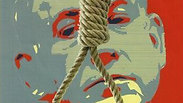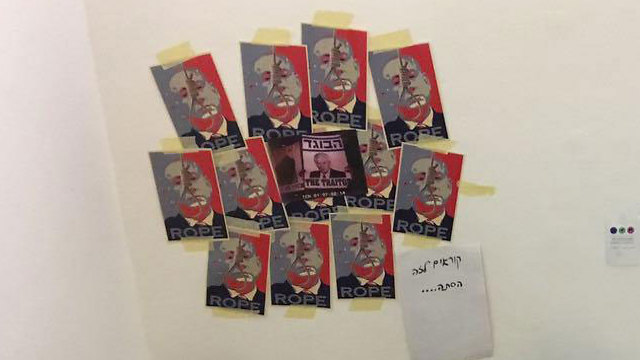
AG launches probe into poster of Netanyahu behind a noose
Mandelblit to examine whether the art piece, plastered in the hallway of the Bezalel Academy of Arts and Design in Jerusalem, incites to violence.
Attorney General Avichai Mandelblit launched an investigation Tuesday into a poster bearing the image of Prime Minister Benjamin Netanyahu behind a noose, sparking a debate over the limits of freedom of expression in an increasingly polarized society.
The poster, a riff on the "hope" poster from US President Barack Obama's 2008 campaign, was plastered in the hallway at Jerusalem's prestigious Bezalel Academy of Arts and Design, apparently by a student, and swiftly removed. The word "hope" in the original poster was replaced by the word "rope."
Noam Sharvit, a Justice Ministry spokesman, said the probe was launched to look into suspicions that the poster incited to violence.
Bezalel's students' union said that it did not know who was behind the poster, but did clarify that it was the work of an individual student expressing themselves artistically, clarifying, "We certainly do not support messages calling for violence and incitement of any kind whatever and even oppose that. However, as a design institution, we believe in the freedom of expression and art and are for providing an expression for the entire rainbow of opinions, within the boundaries of the law."
Its chairman, Nadav Heipert, said, "In Bezalel, lots of strange works are hung on the wall, some of which are connected to politics and some of which aren't."
Bezalel itself commented that it was investigating if the posters were part of a course assignment of the private work of a student.
Regardless, they said, the creation was a creation internal to Bezalel "as part of an ongoing dialogue on design, art and culture, including the issues of borders, reproducing images and memory. The exercise, more or less successful, is part of professional discourse, hung on the internal wall in a stairwell in the academy and not presented publicly, has no political incitement and should be judged accordingly."
Culture Minister Miri Regev, a staunch Netanyahu supporter, wrote on Facebook that "artistic freedom is not freedom to incite," and called for Bezalel's funding to be cut.
Dovish opposition legislators said such a move would trample on the right to free expression, while acknowledging the poster was in bad taste.
"What disturbs me in this context is the immediate lashing out that calls for denying funding to Bezalel," Meretz leader Zehava Galon told Army Radio. "We need to leave wide margins for freedom of expression unless it borders on bloodshed."
Israel has a flourishing arts scene bolstered by world class academies, galleries and museums.
Last week, an artist erected a golden statue of Netanyahu in a central Tel Aviv square that drew a stream of selfie-taking passersby before being toppled by a bystander. The statue was interpreted as a commentary on his lengthy rule and reputation for a lavish lifestyle.
But critics say that dissent is being stifled under the current government, the most nationalistic in the country's history.
Regev has been one of the prime targets of that criticism, with many liberal Israelis saying she expects their artistic output to conform to her nationalistic worldview. Regev has publicly clashed with liberal actors and entertainers, and has threatened to cut funding for institutions that refuse to perform in Jewish settlements in the West Bank.
Adi Stern, the president of Bezalel, told Army Radio that the poster had been taken out of context. He said it appeared with a poster of former Prime Minister Yitzhak Rabin with the word "traitor" printed underneath. Such posters were common ahead of Rabin's 1995 assassination, part of a climate of incitement that many say inspired the killing. Another sign on display at the academy read: "It's called incitement."
Stern said he interpreted the display as a general commentary on incitement.
Ahead of Rabin's assassination, Netanyahu, who served as opposition leader at the time, addressed a protest in downtown Jerusalem where demonstrators held posters portraying Rabin in an Arab headscarf or Nazi uniform. Netanyahu denies he incited against Rabin in the months leading up to his death, claiming he didn't see the banners or hear violent chants.
Shahar Chai & Yael Freidson contributed to this report.











